Jose Angel Araguz's Blog, page 3
December 28, 2023
some highlights, 2023
I am happy to report that I continue to have a hundred percent survival rate. This is a phrase I’ve picked up from my therapist. It shook me the first time she said it. The acknowledgment of still being here despite the struggles and setbacks over the years hit like a punch in the gut. That still being here is an accomplishment, something to build on, not just the frayed edges of just enough.
Here’s to keeping that up, all of us.
As the year wraps up, here are some things I’m proud to have produced or helped produce from the year:

First and foremost, I am proud to have my lyric memoir, Ruin & Want (Sundress Publications), out in the world! Thank you to everyone who has gotten a copy and spent time with it. I appreciate all the kind words folks have shared.
It was a hard project to get out, but a necessary one (I spoke at length of what this project entailed in an interview with Sundress Publications).
This book is a testament to that hundred percent survival rate that I spoke of above. More than anything I hope it helps people.

Also, I am honored to have helped bring into the world this powerful e-chapbook by Maria S. Picone, Water Gwisin Saves the Earth. Picone was selected as the 2023 Louisa Solano Memorial Emerging Poet Award winner over at Salamander. Such a great poet, such a great collection of poems. I encourage folks to check it out.

I am also happy to be serving on the Advisory Editorial Board over at Swing who put out their first issue this year! Proud to see them put together a dynamic issue!

Lastly, I am happy to have published a review of Dream of Xibalba by Stephanie Adams-Santos over at Lambda Literary Review. This book invites an open approach with one’s own lyric sensibility. Surprise that a book about the Mayan underworld is a trip.
Biggest highlight is still being alive.
Hope folks are staying safe out there!
Abrazos,
José
November 25, 2023
Ruin & Want interview excerpts, final part
Here’s the final excerpt from my Sundress Publications interview with Izzy Astuto. Thank you to everyone who took the time to read some of these. Had one friend refer to them as part craft talk which means so much. These words, in the book, on slides, here between us, matter so much.
Thanks to those of you who have pre-ordered Ruin & Want and who are considering doing so and/or requesting the book at your public library!
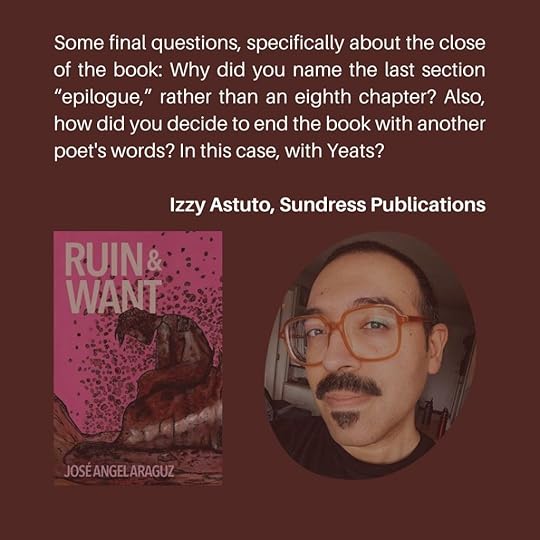
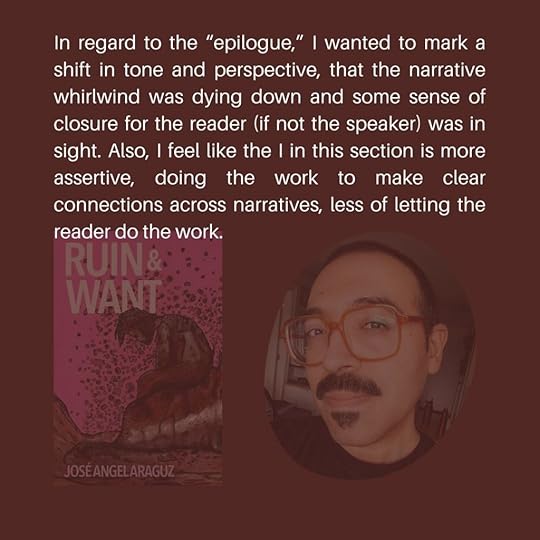
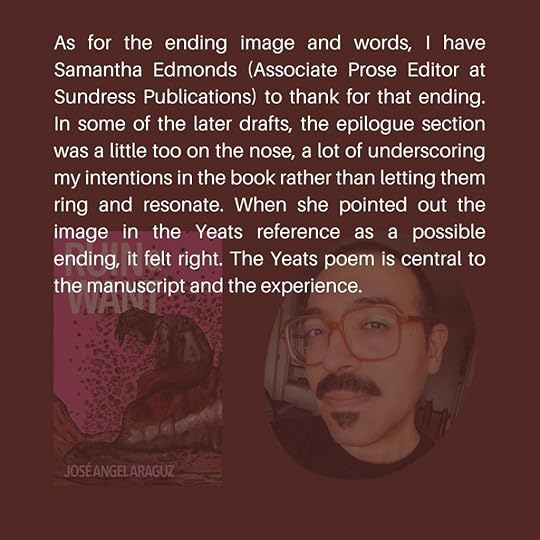
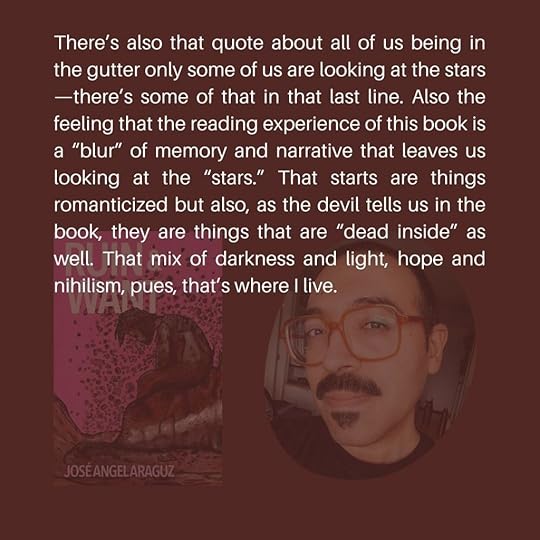
Izzy Astuto: Some final questions, specifically about the close of the book: Why did you name the last section “epilogue,” rather than an eighth chapter? Also, how did you decide to end the book with another poet’s words? In this case, with Yeats? , Sundress Publications
José: In regard to the “epilogue,” I wanted to mark a shift in tone and perspective, that the narrative whirlwind was dying down and some sense of closure for the reader (if not the speaker) was in sight. Also, I feel like the I in this section is more assertive, doing the work to make clear connections across narratives, less of letting the reader do the work.
As for the ending image and words, I have Samantha Edmonds (Associate Prose Editor at Sundress Publications) to thank for that ending. In some of the later drafts, the epilogue section was a little too on the nose, a lot of underscoring my intentions in the book rather than letting them ring and resonate. When she pointed out the image in the Yeats reference as a possible ending, it felt right. The Yeats poem is central to the manuscript and the experience.
There’s also that quote about all of us being in the gutter only some of us are looking at the stars—there’s some of that in that last line. Also the feeling that the reading experience of this book is a “blur” of memory and narrative that leaves us looking at the “stars.” That starts are things romanticized but also, as the devil tells us in the book, they are things that are “dead inside” as well. That mix of darkness and light, hope and nihilism, pues, that’s where I live.
More Ruin-related content soon 
José
November 24, 2023
Ruin & Want interview excerpts, pt. 7
Continuing sharing excerpts from my Sundress Publications interview with Izzy Astuto. Here, a question about identity has me opening up about the transformative nature of writing this book. That the literal acceptance of the manuscript sparked in me the possibility of accepting myself. Also some friendly shout-outs and thoughts on community.
Do consider pre-ordering Ruin & Want if you’re able, or suggest it to your local library. Stay tuned for one more set of interview slides!
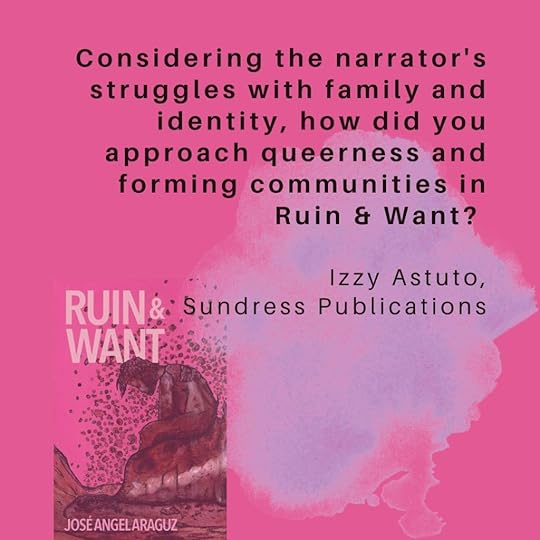
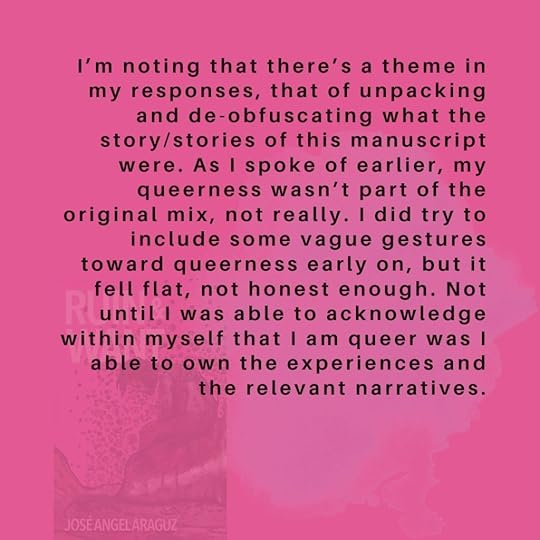
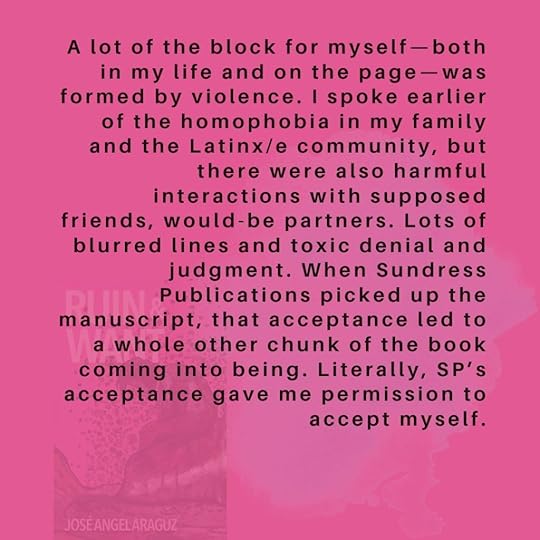
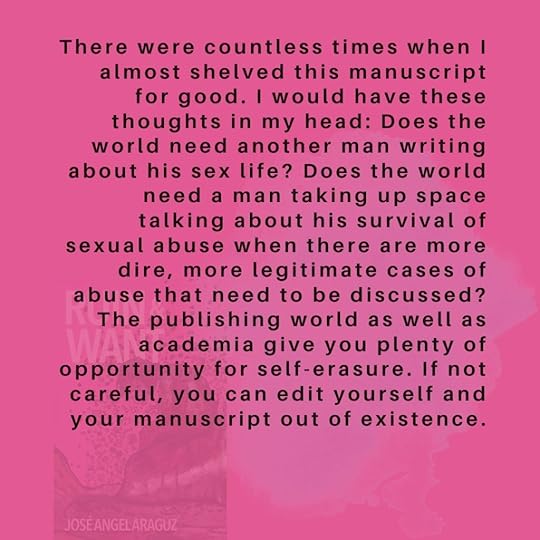
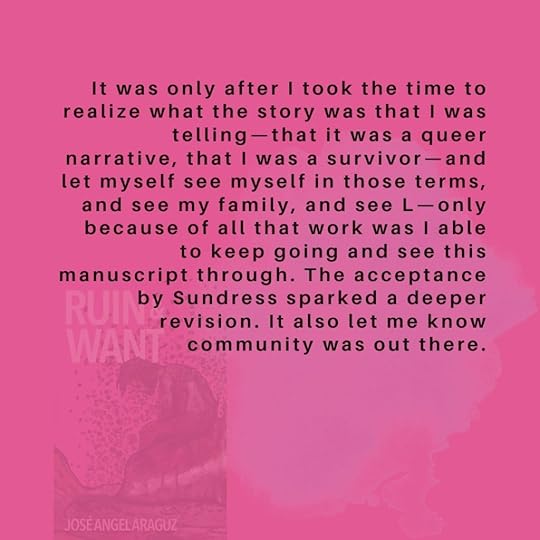
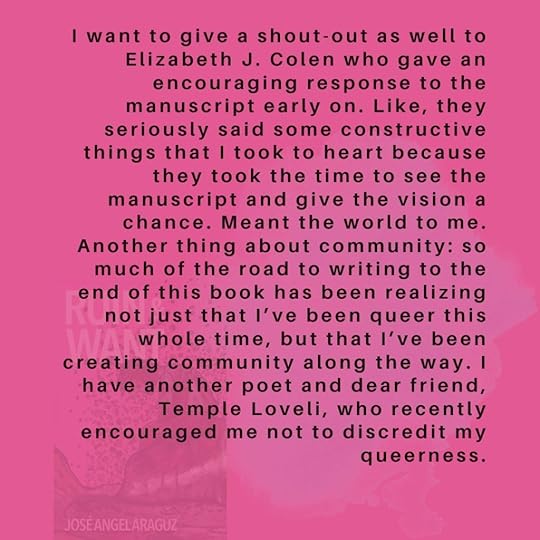
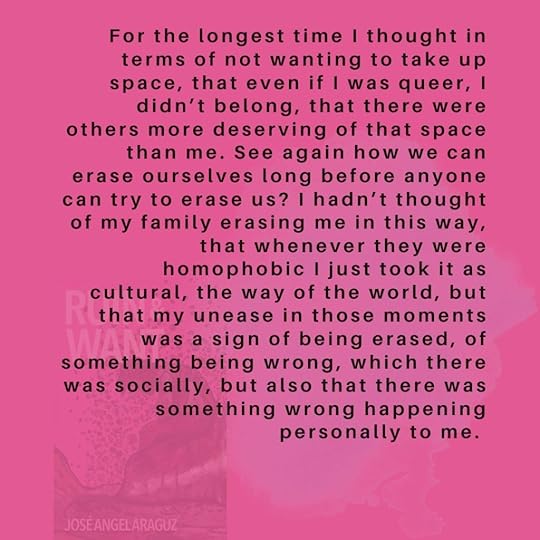
Izzy Astuto: Considering the narrator’s struggles with family and identity, how did you approach queerness and forming communities in Ruin & Want?
José: I’m noting that there’s a theme in my responses, that of unpacking and de-obfuscating what the story/stories of this manuscript were. As I spoke of earlier, my queerness wasn’t part of the original mix, not really. I did try to include some vague gestures toward queerness early on, but it fell flat, not honest enough. Not until I was able to acknowledge within myself that I am queer was I able to own the experiences and the relevant narratives.
A lot of the block for myself—both in my life and on the page—was formed by violence. I spoke earlier of the homophobia in my family and the Latinx/e community, but there were also harmful interactions with supposed friends, would-be partners. Lots of blurred lines and toxic denial and judgment. When Sundress Publications picked up the manuscript, that acceptance led to a whole other chunk of the book coming into being. Literally, SP’s acceptance gave me permission to accept myself.
There were countless times when I almost shelved this manuscript for good. I would have these thoughts in my head: Does the world need another man writing about his sex life? Does the world need a man taking up space talking about his survival of sexual abuse when there are more dire, more legitimate cases of abuse that need to be discussed? The publishing world as well as academia give you plenty of opportunity for self-erasure. If not careful, you can edit yourself and your manuscript out of existence.
It was only after I took the time to realize what the story was that I was telling—that it was a queer narrative, that I was a survivor—and let myself see myself in those terms, and see my family, and see L—only because of all that work was I able to keep going and see this manuscript through. The acceptance by Sundress sparked a deeper revision. It also let me know community was out there.
I want to give a shout-out as well to Elizabeth J. Colen who gave an encouraging response to the manuscript early on. Like, they seriously said some constructive things that I took to heart because they took the time to see the manuscript and give the vision a chance. Meant the world to me. Another thing about community: so much of the road to writing to the end of this book has been realizing not just that I’ve been queer this whole time, but that I’ve been creating community along the way. I have another poet and dear friend, Temple Loveli, who recently encouraged me not to discredit my queerness.
For the longest time I thought in terms of not wanting to take up space, that even if I was queer, I didn’t belong, that there were others more deserving of that space than me. See again how we can erase ourselves long before anyone can try to erase us? I hadn’t thought of my family erasing me in this way, that whenever they were homophobic I just took it as cultural, the way of the world, but that my unease in those moments was a sign of being erased, of something being wrong, which there was socially, but also that there was something wrong happening personally to me.
More tomorrow!
José
November 23, 2023
Ruin & Want interview excerpts, pt. 6
Continuing sharing excerpts from my Sundress Publications interview with Izzy Astuto. This time around, I’m discussing the juxtaposition of sex and violence. As always, it comes back to trauma and T.S. Eliot’s Wasteland. Same thing really.
Do consider preordering Ruin & Want!
[CW: talk of violence, sexual abuse.]




Izzy Astuto: Can you speak more on the juxtaposition of sex and violence in this book?
José: What’s that Tolstoy quote? “Happy families are all alike; every unhappy family is unhappy in its own way.” It’s not enough to say I grew up in a dysfunctional family as every family dysfunctions differently. I grew up with the United States version of toxic masculinity fed to me through TV and school, but I also inherited machismo through my family. I was raised by two strong women, my mom and my tia, who through their love and hard work helped keep me alive, and yet, even without the presence of a man in the house, machismo crept through the sexualized, gendered teasing I’d receive and the gendered expectations of what a man should be. That’s the insidious nature of patriarchal violence; we pass it on unintentionally if we’re not careful.
There’s also the violence of systemic oppression, of growing up below the poverty line, of living with the fear of border patrol, INS, now ICE. I knew I didn’t want to perpetuate toxic stereotypes of the male gaze but more the violence and harm people cause each other through ignorance and despite good intentions (along with bad intentions). There’s also the violence of an eating disorder, a condition of self-harm tinged and/or urged on, in some part, by sexual desire, the need to be attractive.
I name all this to say that some of what I’m interrogating here is the ways in which sex and violence imply each other. That it’s not a simple thing. The first night L touched me physically didn’t have to happen; and when it did happen, there was the intimacy of sex as well as the intrusion of violence, of crossed lines. I guess I’m saying the book is messy because life is—which is something I don’t want to have to say, mainly because it’s what scholars say to excuse and justify Eliot’s Wasteland, jaja.
More tomorrow!
José
November 22, 2023
Ruin & Want interview excerpt, pt. 5
Continuing sharing excerpts from my Sundress Publications interview with Izzy Astuto. Oof. This question had me reflecting on some of the hard truths of writing this project. When I talk about working on myself, it is this interrogation of self and the dismantling of the white supremacist, capitalist, patriarchal systems that are ingrained in our Western consciousness.
Do consider pre-ordering my book if you’re able and interested in seeing how this work sounds, feels like. Either way, enjoy my rambling route and stay tuned for more!




Izzy Astuto: Were there any parts of this that felt uniquely difficult to write about?
José: All of it, haha! I mean, what I’ve shared so far about the process of writing this book I hope shows the lengths I was willing to go both in terms of writing craft but also personal growth as well. I knew I had my work cut out for me when my dissertation committee (all white cis-het males) responded to the book by calling it “sexy.” Soon as I heard that response, I realized that I had written it all wrong. My goal hadn’t been to write some Henry Miller-esque text that exalted in toxic heteronormativity, and yet, that was what I had written. Through my formal education, it was all I knew how to write. It was yet another lesson of trusting myself to write from my authentic self rather than some perceived, white idea of literariness.
This has always been the struggle, to write the thing in the way only I can write it. Academia and creative writing are very white spaces. I mean, I’ve shared that my focus for the Ph.D. were Latinx/e poetics and hybrid forms, but I ended up fielding questions about T.S. Eliot, Ezra Pound, and the translations of Richard Howard—none of which were on my reading lists or were written about in my exams. I specifically dived into my studies to ground myself in Latinx/e traditions and yet here I was having to talk about the frkn Wasteland and Whitman. That’s what I mean by calling these spaces white. It’s an influence so pervasive that marginalized writers have to actively dismantle and seek out other traditions.
The other aspect that felt distinctly difficult to write about was my queerness as it relates to my family. Only now that the project is done am I able to see the implications of what I named in this project, specifically the homophobia inherit not just in my family but in Latinx/e culture in general. It’s something I teach about—how Latinidad is an imperfect concept and needs to be regarded as living and in need of critique as well as efforts toward restorative justice for its inherent anti-Blackness and homophobia—but in the same way that I wouldn’t let myself see myself as a survivor, I haven’t been able to see myself as affected by it myself. Only recently have I allowed myself to own my queerness, and with the positive of acceptance necessarily comes the acknowledgment of what kept me from accepting myself.
More tomorrow!
José
November 21, 2023
Ruin & Want interview excerpt, pt. 4
Continuing sharing excerpts from my Sundress Publications interview with Izzy Astuto. Here, he asks about the section of the memoir entitled “Devil or Nothing: An Abandoned Manuscript.” Essentially, I read a cool quote from French philosopher Luc Ferry then hilarity (in the form of philosophical riffing) ensued!
Do consider pre-ordering my book if you’re able and interested. Either way, enjoy my rambling route and stay tuned for more!




Izzy Astuto: Can you talk about chapter five, the abandoned manuscript, and why you came back to it for this book? Why was it abandoned? Izzy Astuto, Sundress Publications
José: I had started working on the devil riffs in 2011 after reading Luc Ferry’s A Brief History of Thought: A Philosophical Guide to Living. In it, he referenced the idea of “diabolos” or “the who who divides.” I remember writing that down in my notebook and thinking about it every once in a while, riffing on ideas of division and duality in freewrites. The more I wrote, the more I felt that I wasn’t writing about religion directly, instead taking the devil on as a lens, how we humanize the devil and project onto them everything from our misdeeds to an idealized swagger and power. So, the breakthrough of using one narrative as a lens with which to approach other narratives was practiced with the devil first.
When I began working on what would be the first draft of this book, the devil riffs naturally came to mind as an element to put in play. It was around this time, too, that the moment happened where the word devil was confused for double—a natural moment in conversation that made it into the world of the book. Every draft of this book had these devil riffs (I keep calling them riffs as they never felt like poems but more that they borrow from philosophy and aphorism) scattered throughout. They always stood out to folks who read the manuscript, the reactions a mix of confusion and amusement. The idea of bringing them all together under one title came late in the process, and was born after reading an article about books that don’t exist. As I read it, it occurred to me that the devil riffs were their own book within a book, so I tried a draft with it. Once I saw them all together, I was inspired to add some further riffing, turning out what you see in the final version.
This book within a book allowed for a different voice from the main speaker of the manuscript. This shift also allowed the devil voice to address a “you” which is both me and the reader of the book, which is eerie (I hope). Suddenly the devil is not just the usual projections and excuses (the devil made me do it) but also devil as conscience, devil as speaking in a more assertive register than the speaker elsewhere. Note, too, that the devil says things that L turns out to have said, and also riffs against some of the speaker’s own words. Here, again, the idea of the double. The play of “Devil or nothing” was one of the final things to be written. I suppose that the manuscript is abandoned in order to enact the “nothing” half of it.
More tomorrow!
José
November 20, 2023
Ruin & Want interview excerpt, pt. 3
Continuing sharing excerpts from my Sundress Publications interview with Izzy Astuto. Here I react to Izzy’s awesome note about “syncopated format.” I definitely wanted the troubled sense I felt while writing to have a formal role in the project. Getting there was another thing, haha.
Do consider pre-ordering if you’re able and interested. Either way, enjoy my rambling route and stay tuned for more!



Izzy Astuto: When did the almost syncopated format of this book come to be?
José: Syncopated—what a great word! That feels right. As you can tell from above, the living / writing of this book was messy! From the start I wanted this to be a distinct reading experience, one marked by fragmentation and juxtaposition. I wanted the reading experience to be like walking across an old wood floor, each passage a step inviting creaks and give. That’s what it felt like writing it, like I was up at a time no one else was and didn’t want to disturb anyone or draw attention to myself.
José: At one point in the memoir, I talk about trying to write of L and looking over my shoulder anxiously. Part of how this effect was created was formally through the lack of essay titles and the brevity of passages. I also approached this effect conceptually. A number of early drafts had me printing out the manuscript in a “shrunken” form (four pages per page) and cutting those pages up so that the manuscript looked like a deck of tarot cards. I then shuffled and reshuffled, literally, inviting chance to help guide the mix of narratives.
More tomorrow!
José
November 19, 2023
Ruin & Want interview excerpt, pt. 2
Continuing sharing excerpts from my Sundress Publications interview with Izzy Astuto. Here, I go off at length at the process of entangling myself in the project, navigating trauma and self-work, and then having to find my way out via the final draft.
Do consider pre-ordering if you’re able and interested. Either way, enjoy my rambling route and stay tuned for more!
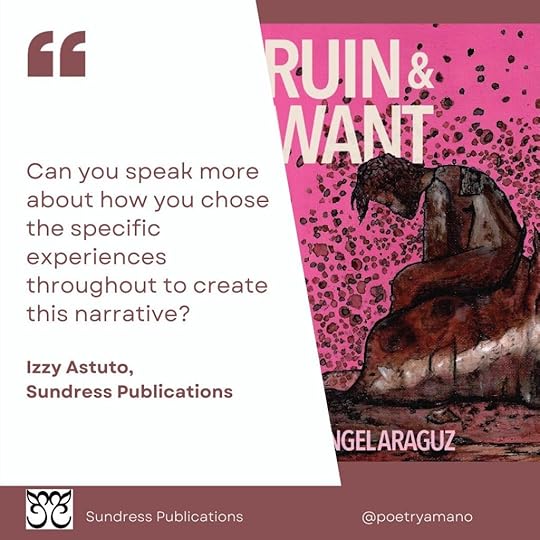
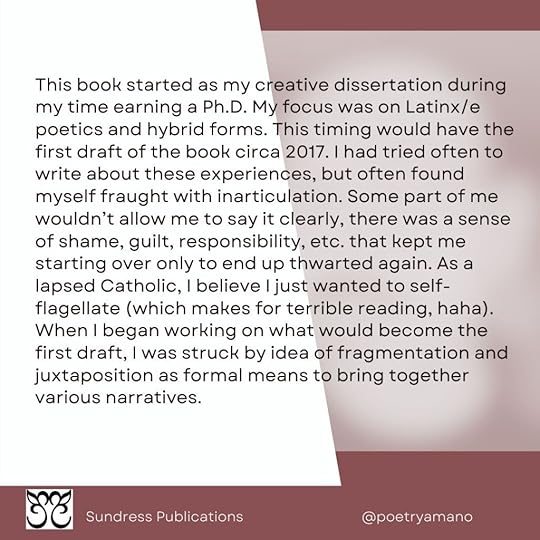
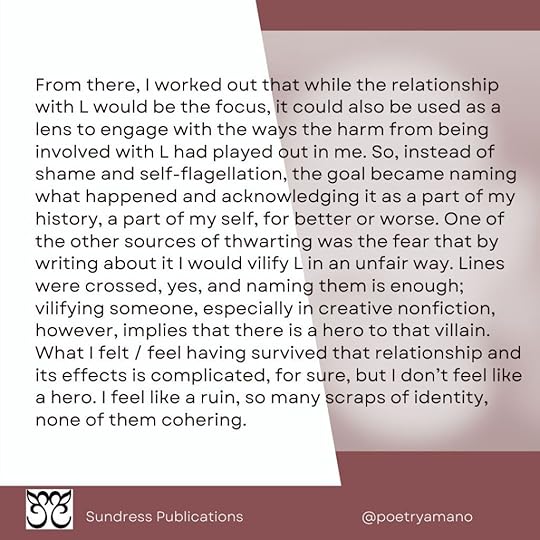
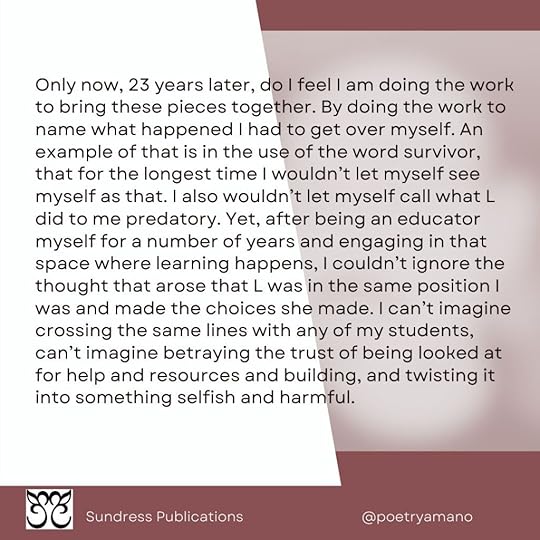
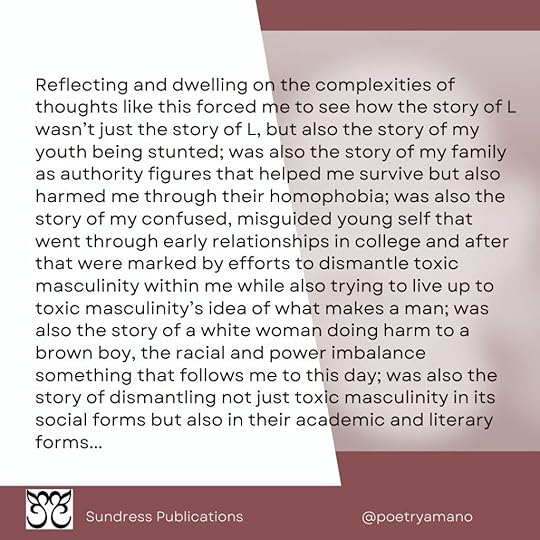
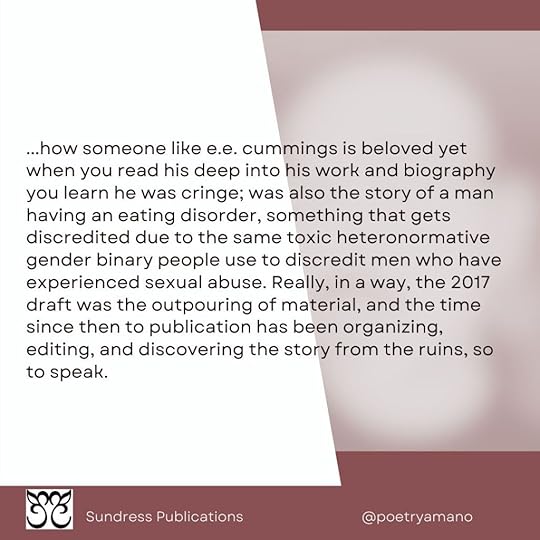
Izzy Astuto: Can you speak more about how you chose the specific experiences throughout to create this narrative?
José: This book started as my creative dissertation during my time earning a Ph.D. My focus was on Latinx/e poetics and hybrid forms. This timing would have the first draft of the book circa 2017. I had tried often to write about these experiences, but often found myself fraught with inarticulation. Some part of me wouldn’t allow me to say it clearly, there was a sense of shame, guilt, responsibility, etc. that kept me starting over only to end up thwarted again. As a lapsed Catholic, I believe I just wanted to self-flagellate (which makes for terrible reading, haha). When I began working on what would become the first draft, I was struck by idea of fragmentation and juxtaposition as formal means to bring together various narratives.
From there, I worked out that while the relationship with L would be the focus, it could also be used as a lens to engage with the ways the harm from being involved with L had played out in me. So, instead of shame and self-flagellation, the goal became naming what happened and acknowledging it as a part of my history, a part of my self, for better or worse. One of the other sources of thwarting was the fear that by writing about it I would vilify L in an unfair way. Lines were crossed, yes, and naming them is enough; vilifying someone, especially in creative nonfiction, however, implies that there is a hero to that villain. What I felt / feel having survived that relationship and its effects is complicated, for sure, but I don’t feel like a hero. I feel like a ruin, so many scraps of identity, none of them cohering.
Only now, 23 years later, do I feel I am doing the work to bring these pieces together. By doing the work to name what happened I had to get over myself. An example of that is in the use of the word survivor, that for the longest time I wouldn’t let myself see myself as that. I also wouldn’t let myself call what L did to me predatory. Yet, after being an educator myself for a number of years and engaging in that space where learning happens, I couldn’t ignore the thought that arose that L was in the same position I was and made the choices she made. I can’t imagine crossing the same lines with any of my students, can’t imagine betraying the trust of being looked at for help and resources and building, and twisting it into something selfish and harmful.
Reflecting and dwelling on the complexities of thoughts like this forced me to see how the story of L wasn’t just the story of L, but also the story of my youth being stunted; was also the story of my family as authority figures that helped me survive but also harmed me through their homophobia; was also the story of my confused, misguided young self that went through early relationships in college and after that were marked by efforts to dismantle toxic masculinity within me while also trying to live up to toxic masculinity’s idea of what makes a man; was also the story of a white woman doing harm to a brown boy, the racial and power imbalance something that follows me to this day; was also the story of dismantling not just toxic masculinity in its social forms but also in their academic and literary forms…
…how someone like e.e. cummings is beloved yet when you read his deep into his work and biography you learn he was cringe; was also the story of a man having an eating disorder, something that gets discredited due to the same toxic heteronormative gender binary people use to discredit men who have experienced sexual abuse. Really, in a way, the 2017 draft was the outpouring of material, and the time since then to publication has been organizing, editing, and discovering the story from the ruins, so to speak.
More tomorrow!
José
November 18, 2023
Ruin & Want interview excerpt, pt. 1

In the next few days I’ll be sharing excerpts from an interview I did with Sundress Publications. Izzy Astuto asked me some insightful questions. Hope my answers make sense, haha.
I am placing the visual slides I created below as well as the text of the interview excerpt below that.
And please pre-order my new book, it would mean a great deal to me–you can do so on the Sundress Publications site!
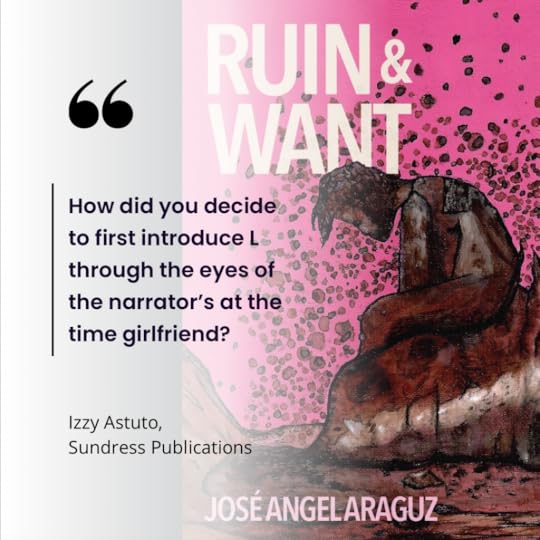
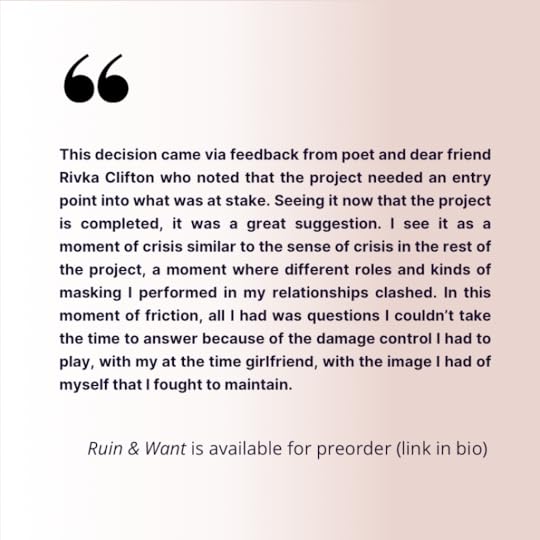
INTERVIEW EXCERPT
Izzy Astuto: How did you decide to first introduce L through the eyes of the narrator’s at the time girlfriend?
José: This decision came via feedback from poet and dear friend Rivka Clifton who noted that the project needed an entry point into what was at stake. Seeing it now that the project is completed, it was a great suggestion. I see it as a moment of crisis similar to the sense of crisis in the rest of the project, a moment where different roles and kinds of masking I performed in my relationships clashed. In this moment of friction, all I had was questions I couldn’t take the time to answer because of the damage control I had to play, with my at the time girlfriend, with the image I had of myself that I fought to maintain.
More tomorrow!
José
October 27, 2023
Ruin & Want available for pre-order!
 Book cover for Ruin & Want, cover art by Ani Araguz
Book cover for Ruin & Want, cover art by Ani AraguzJust a quick note to share that my lyric memoir, Ruin & Want, is available for pre-order from Sundress Publications! Pre-orders help a lot in getting a book out into the world. It’d mean so much to me to have the support. The pre-order price for my book is also at a discount.
One of the dynamic, community-oriented things that Sundress Publications does for its authors is donate 10% of pre-orders to a nonprofit of their choice. For my book, I chose The Partnership for Inclusive Disaster Strategies (The Partnership), “the only U.S. disability-led organization with a focused mission of equity for people with disabilities and people with access and functional needs throughout all planning, programs, services and procedures before, during and after disasters and emergencies.”
If money is an issue, you can also support by suggesting your local library preorder the book and requesting it for checkout as soon as it becomes available. This achieves the same end—a copy of the book is still preordered and purchased—and also helps place the book in your library for readers in your community.
Here’s the description of the project:
Is selfhood constructed? And if so, by whom? Exploring queerness, race, body image, and family, Ruin & Want is a masterful meditation on otherness and identity. In a series of gripping, episodic prose pieces centered on an illicit relationship between a student and his high school English teacher, Araguz peels back the layers of his marginalized identity. By reflecting on his childhood into adulthood, Araguz grapples with finding a sense of self when early, predatory experiences have deeply affected his coming-of-age. In quixotic, deeply eviscerating lyric prose, Araguz delivers a troubling but bold memoir that handles this topic with courage while grieving what it costs survivors to reckon with harm’s aftermath. Yet in the midst of this struggle, we find many bittersweet and lingering gifts such as, “For the first time I saw myself as someone worth seeing,” that make this work necessary and unforgettable.
I’ll be sharing updates on events and related matters throughout the month of November. The official publication date is November 28, 2023.
I am also working on landing here more regularly. Stay tuned!
Abrazos,
José



